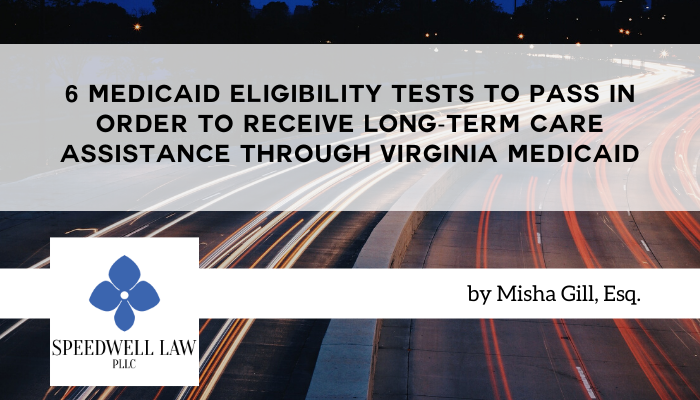
6 Medicaid Eligibility Tests To Pass In Order To Receive Long-Term Care Assistance Through Virginia Medicaid
The decision to move a spouse into a nursing home is never easy. In fact, it is a choice that many elderly couples dread having to make. Because Medicaid offers more comprehensive long-term care coverage than Medicare, and the cost of long-term care is so high, many elderly couples rely on Medicaid to pay the cost of long-term care for a spouse in need.
Qualifying for Medicaid is the first step towards receiving much-needed long-term care assistance.
But, how do you qualify?
Here are six tests that an institutionalized spouse (the spouse in need of long-term care) of a non-institutionalized spouse (also referred to as the community spouse) must pass in order to qualify to have Virginia Medicaid pay for their long-term care.
1. Citizenship
Unless the applicant is already enrolled in Medicare or receiving Social Security Disability or SSI benefits, he or she must show proof of their legal status in the United States, as well as, proof of permanent residency in Virginia. Proof of citizenship can be shown by providing a Social Security Number, driver’s license, or other documentation related to a person’s legal status.
2. Age or Disability
The applicant must be 65 years of age or older or disabled as defined by the Virginia Medicaid Manual.
3. Pre Screening
The local health department and department of social services will dispatch a pre-screening team to monitor the applicant’s ability to perform activities of daily living.
4. Monthly Income
Medicaid eligibility requirements take into account the amount of income the applicant’s household brings in every month. However, when only one spouse is applying, only the income of the institutionalized spouse will be counted. In other words, the income of the community spouse will not be considered in determining the institutionalized spouse’s eligibility for Medicaid.
For the institutionalized spouse to be eligible for long-term care assistance through Virginia Medicaid, his or her gross monthly income cannot exceed 300% of the Supplemental Security Income (SSI) amount, currently $2,313. If the gross income does exceed 300% of SSI, the applicant may be able to defer a portion of his or her income to the community spouse in order to qualify.
5. Resources: Countable and Exempt
Medicaid eligibility requirements also take into account the resources available to the applicant. Resources can be broken down into 2 categories:
A. Countable Resources – assets, such as cash, financial accounts, securities, and some real estate, that are considered available to the applicant.
B. Exempt Resources – assets, such as the applicant’s primary home (not to exceed more than $585,000 in equity), one automobile, personal belongings, irrevocable burial trust, and household furnishings, are considered unavailable and ignored for the purposes of establishing the applicant’s eligibility for Medicaid.
In general, the institutionalized spouse cannot have more than $2,000 in countable assets. However, the community spouse can maintain assets up to $126,426.
6. Transfer of Resources
The department of social services can look back up to 5 years from the date an applicant submitted a Medicaid application to determine whether an applicant has given away or sold any resources for less than fair market value. If the applicant has transferred resources for less than fair market value, the department of social services penalizes the applicant by calculating the difference between what the resource was sold for and its fair market value.
Currently, Virginia Medicaid penalizes at a rate of $6,422 per month. So, for every $6,422 you transferred for less than fair market value in the five years before you applied for Medicaid, you will be penalized for one month of Medicaid ineligibility.
Contact Us Today To Discover How To Qualify For Medicaid
Contact our law firm at (703) 553-2577 or [email protected] to arrange a no-cost, no-obligation consultation with an experienced attorney. We’ll show you how to qualify for long-term care assistance through Virginia Medicaid, and provide you with guidance on any other Medicaid and Long-Term Care Planning issue.
Click here to learn more about our Medicaid services and to schedule your free consultation.
The information on this site is for general informational purposes only. The information presented in this site is not legal advice or a legal opinion. You should seek the advice of legal counsel of your choice before acting upon any of the information in this site.





